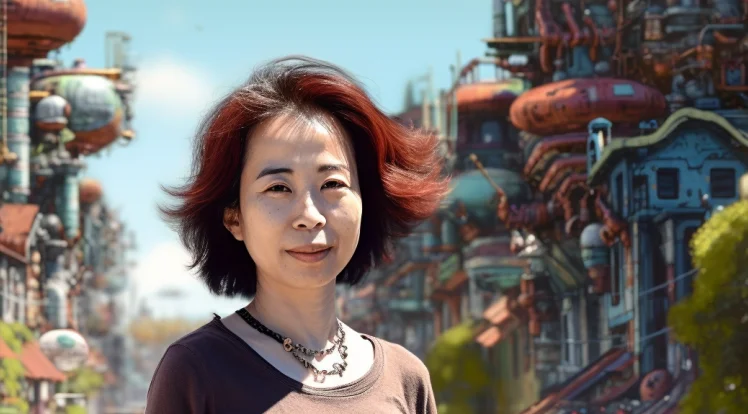- Fei-Fei Li made a groundbreaking contribution to the field of artificial intelligence by creating ImageNet, a massive, labeled dataset that significantly advanced computer vision technology, leading to developments in areas such as self-driving cars and facial recognition.
- Li has been a fervent advocate for the ethical use of AI and has emphasized the importance of diversity in AI development to avoid potential biases and unfair outcomes. She’s focused on ensuring AI serves as a positive transformative force for society.
- Beyond her technological accomplishments, Li’s commitment to education and diversity is notable. She co-founded AI4All, a nonprofit aiming to increase representation in AI. After her tenure as Chief AI Scientist at Google Cloud, she returned to Stanford to launch a center studying the intersection of AI and humanity.
Fei-Fei Li, the brain behind ImageNet, is not just a visionary in the field of Artificial Intelligence (AI), but has also emerged as a proponent of ethical AI considerations. Her journey began in Chengdu, China, where she was born, and brought her to New Jersey at the tender age of 16. As an immigrant teen, Li navigated not only a language barrier but also thrived in an unfamiliar environment, becoming her parents’ advocate and translator.
Li’s academic prowess won her a scholarship to Princeton University, where she studied physics and computer science while helping her parents run their dry-cleaning business. She furthered her studies at Caltech, finding a fascinating intersection between neuroscience and computer science.
ImageNet: Revolutionizing computer vision
Li’s significant contribution to AI, ImageNet, was born out of this intersection. ImageNet, a colossal database of labeled images, provided a robust platform for computers to recognize and analyze images. Despite initial skepticism about the idea, Li’s determination and hard work led to the successful creation of this database, which would revolutionize the field of AI.
ImageNet was later put to the test in a computer-vision competition and emerged victorious, reducing the error rate for computers identifying objects in images to less than 3 percent. This accomplishment had a domino effect, influencing subsequent advancements in self-driving cars, facial recognition, and object identification.
AI ethics: A call for responsibility
With the rapid integration of AI into society, Li’s focus turned towards the ethical implications of the technology. She addressed the urgency to re-evaluate AI use, foreseeing potential irreversible societal impacts if left unaddressed. Li insisted that AI should serve as a transformative force for society and not an existential threat.
Her quest for responsible AI did not stop there. As a strong advocate for diversity in AI, Li stressed the importance of including diverse perspectives in AI development to avoid bias and unfair outcomes. She exemplified her belief through a project that leveraged AI to enhance human experiences, such as reducing hospital-acquired infections in ICUs by automating the detection of whether hospital workers had forgotten to scrub their hands.
Pioneering change through education
Addressing the gender disparity and underrepresentation in the AI field, Li took an active role in promoting diversity. Along with her student, Russakovsky, she launched AI4All, a program to encourage underrepresented youth into the field of AI. The program’s success is a testament to Li’s firm belief in the power of diversity in AI development.
After her stint as the Chief AI Scientist at Google Cloud, Li returned to Stanford, where she launched a center to study the intersection of AI and humanity. Despite the many challenges she faced, Li remained optimistic about AI’s potential to enhance life and reduce risks in dangerous jobs. She consistently warned of the consequences if the technology was not properly guided, urging everyone in the field to think like ethicists and consider a diverse array of backgrounds in AI development.
Continued influence and recent endeavors
Fei-Fei Li’s influence and stature in the field of AI have grown over the years. Her profound impact has been widely recognized, as evidenced by her election as a member of the American Academy of Arts and Sciences in 2021, and the National Academy of Engineering and the National Academy of Medicine in 2020. These prestigious bodies acknowledged her for her exceptional contributions in the sphere of AI.
In May 2020, her expertise led to her appointment to the board of directors of Twitter as an independent director. Her tenure at Twitter was marked by her robust insights into technology and ethical AI usage, which were invaluable to the platform’s strategic direction. However, in a twist of events on October 27, 2022, following Elon Musk’s acquisition of Twitter, Li and eight others were removed from Twitter’s nine-member board of directors, leaving Musk as the sole director. Despite the abrupt change, Fei-Fei Li continues to champion the ethical use of AI, underlining the importance of responsibility and diversity in its implementation.






![Fei-Fei Li and a technical future - NewsBites.AI [Fei-Fei-li picture] looking optimistically into a technical future. Optimistic. Hopeful. Happy. Productive. --ar 16:9. Image courtesy of Midjourney, used with permission. All rights reserved.](https://newsbites.ai/wp-content/uploads/2023/05/Fei-Fei-Li-futuristic-1-150x150.png.webp)
